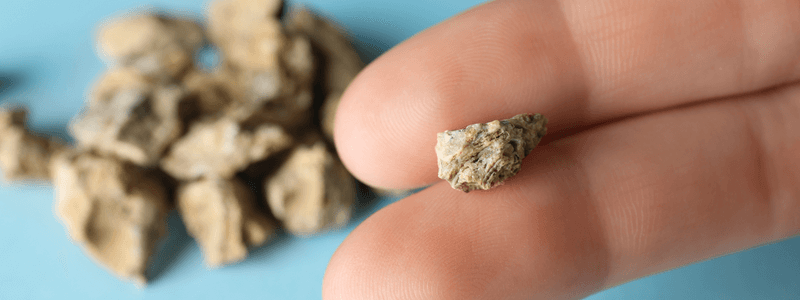
Kidney stones are small, hard deposits of mineral and acid salts that form inside the kidneys. The stones can range in size from a grain of sand to a golf ball and can cause intense pain, discomfort and other symptoms. In this article, we'll explore the causes of kidney stones and ways to prevent them.
What Causes Kidney Stones?
Kidney stones are caused by a buildup of certain substances in the urine, including calcium, oxalate, uric acid, and cystine. When these substances become too concentrated, they can form crystals that can eventually lead to the formation of a stone.
Genetics:
There is a genetic component to kidney stones, and some families have a higher risk of developing them. If you have a family history of kidney stones, you may be more likely to develop them yourself.
Diet:
A diet that is high in salt, sugar, and animal protein can increase your risk of developing kidney stones. On the other hand, a diet that is high in fruits and vegetables, which are high in antioxidants, can help prevent stones from forming.
Dehydration:
Dehydration is another common cause of kidney stones. When you're dehydrated, your urine becomes concentrated, which increases the concentration of substances that can lead to the formation of stones.
Preventing Kidney Stones
Preventing kidney stones is all about making lifestyle changes that can help reduce your risk. Here are some ways to do that:
Stone Breaker+
Take the Stone Breaker+ herbal supplement. Stone Breaker is a popular herbal folk remedy for kidney stones. It is thought to help prevent the formation of calcium oxalate crystals in the kidneys, which can prevent kidney stones from forming again. Research shows that Stone Breaker may also make it easier for the body to pass kidney stones and stop them from forming in the future.
>>> Learn more here
Drink plenty of water:
Drinking plenty of water is one of the best ways to prevent kidney stones. Aim for at least 8 cups of water per day, more if you're active.
Limit salt and animal protein:
Limiting your intake of salt and animal protein can also help reduce your risk of developing kidney stones. Choose low-fat dairy products, and opt for plant-based protein sources instead of animal-based ones.
Increase fiber and calcium:
Eating a diet that is high in fiber and calcium can help prevent kidney stones. Choose foods like nuts, seeds, and whole grains, and consider taking a calcium supplement.
Avoid certain foods:
There are also certain foods that can increase your risk of developing kidney stones. These include sugar, caffeine, and alcohol. Try to limit your consumption of these foods, or avoid them altogether if possible.
FAQs
Q: How long does it take to pass a kidney stone?
A: The length of time it takes to pass a kidney stone can vary depending on the size of the stone and other factors. Some stones may pass in just a few days, while others can take several weeks or longer.
Q: Can kidney stones be treated at home?
A: In some cases, small kidney stones may be able to pass on their own, without treatment. However, larger stones may require medical intervention, including medication or surgery.
Q: What are the symptoms of kidney stones?
A: The symptoms of kidney stones can include severe pain in the back, side, or lower abdomen, nausea and vomiting, blood in the urine, and frequent urination.
Q: Can drinking too much water cause kidney stones?
A: No, drinking too much water is not a cause of kidney stones. In fact, staying hydrated is one of the most effective ways to prevent kidney stones from forming.
Conclusion
Kidney stones can be a painful and debilitating condition, but with the right treatment and prevention strategies, you can reduce your risk of developing these small, hard deposits. By drinking plenty of water, eating a healthy diet, and avoiding certain risk factors, you can help keep your kidneys healthy and prevent the formation of kidney stones.




